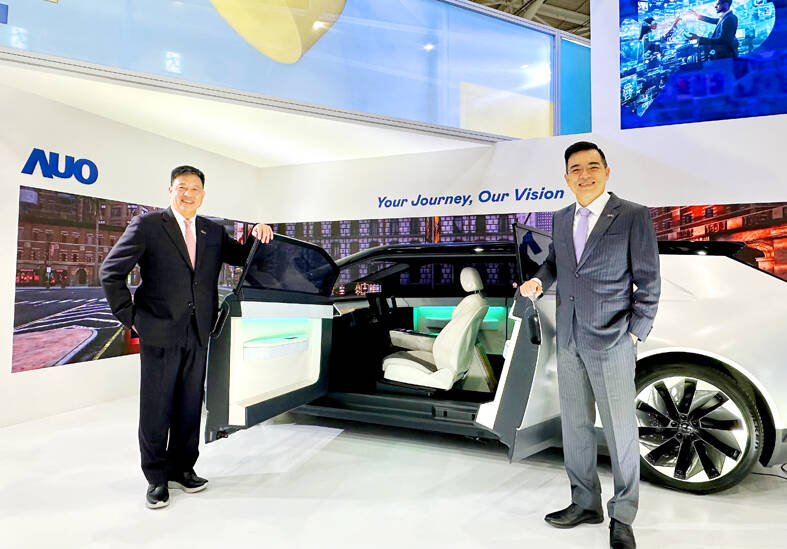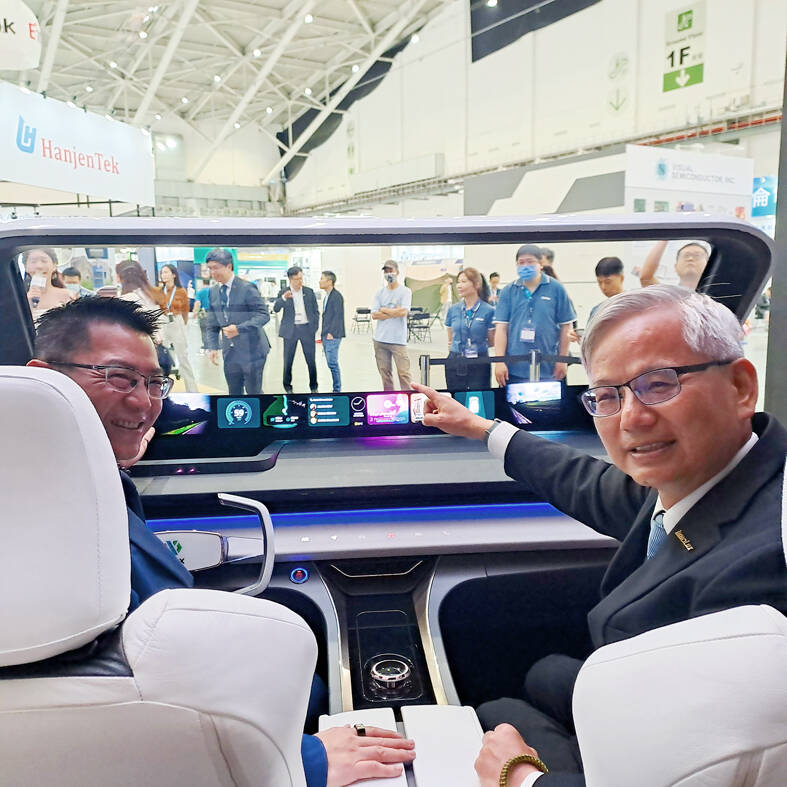Flat-panel display makers AUO Corp (友達) and Innolux Corp (群創) yesterday said that about 12 to 20 percent of their display business is at risk of potential US tariffs and that they would relocate production or shipment destinations to mitigate the levies’ effects.
US tariffs would have a direct impact of US$200 million on AUO’s revenue, company chairman Paul Peng (彭雙浪) told reporters on the sidelines of the Touch Taiwan trade show in Taipei yesterday.
That would make up about 12 percent of the company’s overall revenue.

Photo: Ann Wang, Reuters
To cope with the tariff uncertainty, AUO plans to allocate its production to manufacturing facilities in countries subject to lower US “reciprocal” tariffs, leveraging its global manufacturing footprint, Peng said.
The company has added new manufacturing sites in India, Europe and Mexico following the acquisition of BHTC GmbH, a German cockpit operation system supplier, he said.
The company would not consider building a front-end display manufacturing facility in the US, due to expensive labor costs and the lack of a comprehensive display supply chain in the country, he said.

Photo: Chen Mei-ying, Taipei Times
Innolux also said it had no plans to build a manufacturing site in the US.
As a major vehicle and TV display supplier to tier-one customers, Innolux has a bigger US exposure than other display and component suppliers, chief executive officer Jim Hung (洪進揚) told a news conference in Taipei.
The company ships vehicle displays directly to customers in the US and Europe, with direct exposures of up to 8 to 10 percent, and as TV brands are among its tier-one customers, it has to directly ship TV displays to the US, Hung said.

Photo: CNA
Indirect exposures to the US accounted for about 10 to 15 percent, he said.
Like most component suppliers, Innolux also ships its displays to electronic assemblers’ factories in China, Vietnam, Thailand and other regions, he said.
In the face of rising uncertainty, Innolux has activated a stringent supply chain management mechanism as it did during the COVID-19 pandemic, Hung said.
The aim is to ensure an optimal level of component inventory as customers are scrambling to stock up on as many goods as possible at their hubs during the 90-day tariff pause announced last week by US President Donald Trump, he said.
With the lasting tariff challenges and geopolitical risks, Innolux would be more “selective in terms of manufacturing sites and partners,” compared with its strategies during the pandemic, he said.
The company is considering shifting more TV panels to TV makers in Mexico from China, given that Mexico is subject to a significantly lower US import duty than China, he said.
AUO and Innolux reported new rush orders this quarter as customers strive to avoid US tariffs.
Hung said second-quarter revenue would outgrow Innolux’s original forecast, but he expects a weaker revenue performance in the third quarter.
The US’ fickle tariff policy has upended the display industry’s seasonal patterns, Peng said, adding that AUO’s revenue forecast in February is no longer suitable.
At that time, AUO had predicted revenue to grow gradually each quarter, he said.

In Italy’s storied gold-making hubs, jewelers are reworking their designs to trim gold content as they race to blunt the effect of record prices and appeal to shoppers watching their budgets. Gold prices hit a record high on Thursday, surging near US$5,600 an ounce, more than double a year ago as geopolitical concerns and jitters over trade pushed investors toward the safe-haven asset. The rally is putting undue pressure on small artisans as they face mounting demands from customers, including international brands, to produce cheaper items, from signature pieces to wedding rings, according to interviews with four independent jewelers in Italy’s main

Japanese Prime Minister Sanae Takaichi has talked up the benefits of a weaker yen in a campaign speech, adopting a tone at odds with her finance ministry, which has refused to rule out any options to counter excessive foreign exchange volatility. Takaichi later softened her stance, saying she did not have a preference for the yen’s direction. “People say the weak yen is bad right now, but for export industries, it’s a major opportunity,” Takaichi said on Saturday at a rally for Liberal Democratic Party candidate Daishiro Yamagiwa in Kanagawa Prefecture ahead of a snap election on Sunday. “Whether it’s selling food or

CONCERNS: Tech companies investing in AI businesses that purchase their products have raised questions among investors that they are artificially propping up demand Nvidia Corp chief executive officer Jensen Huang (黃仁勳) on Saturday said that the company would be participating in OpenAI’s latest funding round, describing it as potentially “the largest investment we’ve ever made.” “We will invest a great deal of money,” Huang told reporters while visiting Taipei. “I believe in OpenAI. The work that they do is incredible. They’re one of the most consequential companies of our time.” Huang did not say exactly how much Nvidia might contribute, but described the investment as “huge.” “Let Sam announce how much he’s going to raise — it’s for him to decide,” Huang said, referring to OpenAI

The global server market is expected to grow 12.8 percent annually this year, with artificial intelligence (AI) servers projected to account for 16.5 percent, driven by continued investment in AI infrastructure by major cloud service providers (CSPs), market researcher TrendForce Corp (集邦科技) said yesterday. Global AI server shipments this year are expected to increase 28 percent year-on-year to more than 2.7 million units, driven by sustained demand from CSPs and government sovereign cloud projects, TrendForce analyst Frank Kung (龔明德) told the Taipei Times. Demand for GPU-based AI servers, including Nvidia Corp’s GB and Vera Rubin rack systems, is expected to remain high,